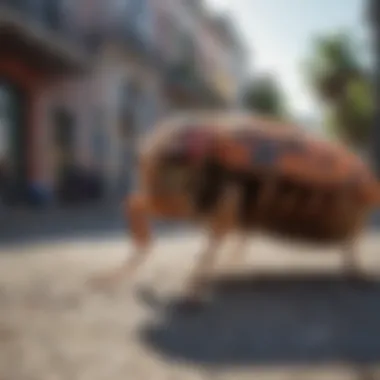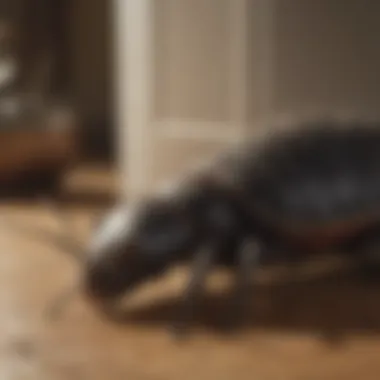Exterminator New Orleans: Expert Pest Management Guide


Intro
Pest management is a critical consideration for homeowners in New Orleans. The city's unique climate and topography create ideal conditions for various pests, making it essential to understand effective management strategies. This article serves as a comprehensive guide, detailing methods ranging from identification and prevention to control. By equipping readers with knowledge about pests and their behaviors, we empower them to make informed decisions about pest management.
Understanding the Pest
Effectively managing pests begins with proper identification. Knowing what type of pest is present allows homeowners to select the right methods for control. Common pests in New Orleans include termites, mosquitoes, and rodents.
Identification
Identifying pests involves observing their physical characteristics, behaviors, and signs of infestation. For instance, termites tend to leave mud tubes or damaged wood in their wake. Mosquitoes often leave itchy bites after feeding. Adequate identification helps in implementing tailored management strategies.
Life Cycle
Understanding the life cycle of pests provides insight into their behaviors and vulnerabilities. For example, knowing the reproductive cycle of mosquitoes can help determine the best times for treatment. Most pests undergo four stages: egg, larva, pupa, and adult. Recognizing these stages enables homeowners to time interventions for maximum effectiveness.
Pest Prevention Strategies
Preventing pest infestations is a crucial step in pest management. By modifying the environment and creating physical barriers, homeowners can reduce the likelihood of pests invading their properties.
Environment Modification
Environmental modification involves altering conditions that attract pests. This can include:
- Keeping food stored in airtight containers
- Ensuring garbage is properly sealed and disposed of
- Maintain limited standing water to control mosquito populations
Physical Barriers
Creating physical barriers is another effective strategy. This includes:
- Sealing cracks and openings around the home
- Installing screens on windows and doors
- Utilizing barriers like mulch or gravel to deter pests from entering living spaces
Control Methods
When prevention fails, control methods become important. There are various techniques available, primarily chemical and biological controls.
Chemical Control
Chemical control involves the use of pesticides. It is vital to choose products that are specific to the pest while considering the safety of children and pets. It is advisable to follow the manufacturer’s instructions carefully.
Biological Control
Biological control is an eco-friendly alternative, utilizing natural predators or parasites to manage pest populations. For example, introducing beneficial insects like ladybugs can reduce aphid populations in gardens. This method emphasizes a balanced ecosystem, reducing reliance on chemical treatments.
Effective pest management is a blend of prevention, control, and continual monitoring. Homeowners should stay vigilant to ensure a pest-free environment.
In summary, understanding the pests present, employing prevention strategies, and utilizing appropriate control methods are vital aspects of pest management in New Orleans. Homeowners can take proactive steps to protect their homes while embracing eco-friendly solutions.
Preamble to Pest Control in New Orleans
Pest control is of significant importance in New Orleans due to the unique climatic and environmental conditions of the region. Pest presence can greatly affect quality of life for homeowners and the local ecosystem. Understanding pest management is crucial for maintaining homes and businesses, ensuring health, and preserving the character of the city. This section will provide an overview of the pests that commonly plague the area, the history of extermination practices, and the climatic influences on pest behavior.
Historical Context of Extermination Practices
Historically, pest control methods have evolved considerably. In the early days, residents relied on simple techniques such as trapping and using natural substances to deter pests. However, as the city grew and urbanization increased, so did the complexity and scale of the pest problem. The introduction of chemical solutions marked a turning point in extermination practices. This process has been refined over the decades, balancing effectiveness with safety concerns.
Learning from past practices allows modern exterminators to implement more holistic approaches today, taking into account not only immediate pest elimination but also long-term prevention strategies.


The Role of Climate in Pest Activity
The climate in New Orleans plays a significant role in pest activity. The hot and humid conditions create an ideal environment for various pests, especially insects. Termites, mosquitoes, and cockroaches thrive in this climate. Understanding seasonal patterns can aid homeowners in preparing for infestations, helping them to take preventative measures during peak seasons.
Dampness from frequent rain increases pest activity, especially within homes. Homeowners must remain vigilant, as some pests can multiply rapidly under these conditions. Recognizing the correlation between climate and pest behavior becomes essential in crafting effective pest management strategies.
Common Pests in New Orleans
Pest management is not just about dealing with a problem as it arises. Understanding the common pests in New Orleans is crucial for effective prevention and control. The unique climate and environment of this region foster various pests that can disrupt daily life for homeowners. Identifying these creatures helps in deploying the right strategies. Awareness is key to ensuring a healthy, pest-free home environment.
Rodents and Their Impact
Rodents, particularly rats and mice, are prevalent in urban settings like New Orleans. They pose health risks due to their ability to transmit diseases such as leptospirosis and hantavirus. Their presence often indicates sanitation issues. Rodents can infest homes, chewing through wires and insulation, which leads to structural damage. This creates a breeding ground for additional pests and problems.
To control rodent populations, it is essential to secure any food sources, seal potential entry points, and maintain clean properties. Setting traps or contacting a professional exterminator should be considered if an infestation occurs.
Insects: Types and Behavioral Patterns
Insects are among the most common pests in New Orleans, with various species like cockroaches, ants, and mosquitoes. Cockroaches thrive in warm, moist environments and can quickly multiply. They trigger allergies and asthma in some individuals, making it critical to address their presence. Ants, especially fire ants, cause painful bites and can infest homes seeking food.
Mosquitoes are particularly problematic in New Orleans due to their ability to transmit diseases like West Nile virus. Behavioral patterns play a role in how these insects can be managed. For example, mosquitoes breed in stagnant water, so eliminating any standing water around properties is vital. Understanding the habits of these insects helps in devising effective control measures.
Termites: Prevention and Control
Termites represent one of the most damaging pests homeowners can face. In New Orleans, the warm climate makes it an ideal habitat for these wood-eating insects. They can cause extensive structural damage before being noticed, which is why prevention strategies are essential. Homeowners should regularly inspect their property for signs of termites, such as mud tubes and discarded wings.
To prevent termite infestations, it is advisable to maintain a barrier between soil and wood structures, store firewood away from the home, and address any moisture issues. If termites are detected, it is critical to act quickly by contacting a qualified exterminator. Treatments may include baiting systems or liquid treatments to eliminate the colony.
"Prevention is far easier and less costly than treatment, especially in cases of termite infestation."
Choosing an Exterminator in New Orleans
Selecting an exterminator in New Orleans requires careful consideration. The unique environment and pest landscape of this city make it crucial to find a professional who understands local challenges. Issues like humidity and temperature create a breeding ground for various pests. Therefore, the right exterminator must possess specific knowledge and skills to effectively address these issues.
Additionally, investing time in choosing a competent exterminator ensures the safety of your home and family. A poorly executed pest control plan can lead to recurring infestations, causing further damage and stress.
Key Qualifications to Look For
When selecting an exterminator, there are several key qualifications you should prioritize:
- Licensing and Certification: Verify that the exterminator holds valid licenses required by the state of Louisiana. This ensures they have met certain educational and skill requirements.
- Experience: Opt for a professional with extensive experience in pest control. Those who have worked in New Orleans specifically will understand the local pest behaviors and patterns.
- Insurance Coverage: Check that they have liability insurance. This protects you against any damages that may occur during the extermination process.
- Knowledge of Integrated Pest Management (IPM): Look for exterminators familiar with IPM principles. This method focuses on long-term prevention and minimizes environmental impact.
Evaluating Pest Control Services
Evaluating pest control services involves a systematic approach. Start by researching the range of services offered. Some companies may specialize in residential areas while others handle commercial settings.
Consider the following factors:
- Techniques Used: Inquire about the methods they use. Ensure they incorporate both chemical and non-chemical solutions for comprehensive pest management.
- Pricing Structure: Request detailed quotes for services. Beware of low prices that may indicate subpar service.
- Response Time: A reputable exterminator should be able to offer services promptly, especially in urgent situations.
Finding Customer Reviews and Testimonials
Customer reviews and testimonials provide insight into the reliability and effectiveness of pest control services. Start by searching online platforms such as Google Reviews or Yelp. Focus on comments regarding:
- Effectiveness: Look for feedback about the exterminator's success rate and pest prevention strategies.
- Professionalism: Note how customers describe their interactions with the pest control team. Professionalism can significantly impact your experience.
- Follow-Up Services: Check if the exterminator provides follow-up services after the initial treatment, as this can enhance the overall effectiveness of pest management.
"A knowledgeable and professional exterminator not only eradicates pests but also educates homeowners on prevention measures."


Techniques Employed by Professional Exterminators
Understanding the techniques employed by professional exterminators is essential for effective pest management. This section details the methodologies used to combat pest infestations. The importance of these techniques lies in their ability to provide sustainable solutions while addressing various pest issues unique to New Orleans. Homeowners benefit significantly from knowing these methods as it empowers them to make informed decisions regarding pest control services. Additionally, comprehending these practices enhances transparency between homeowners and exterminators.
Integrated Pest Management (IPM) Principles
Integrated Pest Management is a strategic approach that combines various techniques for pest control. IPM focuses on long-term prevention of pests through a combination of practices. These practices may include:
- Monitoring Pest Populations: Regularly assessing pest levels helps in deciding when and how to act.
- Biological Control: This involves using natural enemies of pests, such as predators or parasites, to reduce pest numbers.
- Cultural Controls: Modifying practices in the environment to make it less hospitable to pests is another aspect of IPM.
- Mechanical Controls: Using physical methods, such as traps or barriers, to manage pest populations.
By using IPM, exterminators can reduce reliance on chemical pesticides. This approach minimizes potential harm to non-target organisms and the environment, aligning well with the growing preference for eco-friendly solutions.
Chemical vs. Natural Solutions
Both chemical and natural solutions play a role in pest control. Exterminators must evaluate each situation to determine the most appropriate response. Chemical solutions are effective and often provide quick results. However, they come with risks, such as potential health hazards and environmental impacts.
Natural solutions have gained popularity in recent years. These can include:
- Essential oils: Derived from plants, these oils can repel pests without harming the environment.
- Diatomaceous earth: A natural substance that eliminates insects without chemical exposure.
- Homemade traps and barriers: Simple, easy-to-make devices for pest control.
The choice between chemical and natural solutions often depends on the severity of the infestation and the specific pest involved.
Latest Innovations in Pest Control Technology
The pest control industry continues to evolve with the introduction of innovative technologies. New methods and tools enhance the effectiveness of extermination efforts. Some notable advancements include:
- Smart Traps: These devices use sensors and mobile alerts to monitor pest activity in real-time, enabling timely responses.
- Biotechnology in Pest Control: Genetic modifications have led to the development of pest-resistant plants.
- Drone Technology: Drones can survey large areas quickly, identifying pest-infested zones with precision.
These innovations not only improve effectiveness but also often allow for more eco-friendly pest control methods. Homeowners should stay informed about these developments, as they may impact their pest management choices in the future.
"Understanding these techniques enables homeowners to engage more effectively with pest control services, ensuring that their chosen exterminator can deliver optimal solutions for their specific needs."
Homeowners in New Orleans are encouraged to familiarize themselves with these techniques. Doing so fosters better communication with their exterminators and helps them understand the rationale behind the selected pest control methods.
DIY Pest Control Options for Homeowners
Understanding DIY pest control options is crucial for homeowners in New Orleans. Many people prefer to handle pest issues themselves for various reasons. Performing pest control can be cost-effective and allows individuals to take immediate action. Moreover, with the right knowledge and tools, many common pest problems can be managed effectively without needing professional services.
Identifying Infestations Early
Identifying pest infestations early is critical. Prompt recognition can prevent a minor issue from escalating into a larger problem. Homeowners should be vigilant and knowledgeable about signs of infestation. Common warnings include droppings, gnaw marks, or unusual sounds coming from walls.
Additionally, unusual smells should not be overlooked. For instance, a musty odor might indicate mold growth often drawn by moisture, which also attracts pests. Regular inspections in attics, basements, and around foundations can help spot problems sooner. Homeowners should check for cracks or openings that may serve as entry points for pests.
Home Remedies That Work
There are several household items that can be effective against pests. For ants, a mixture of vinegar and water sprayed directly on the ants can disrupt their scent trails. Similarly, baking soda is known to kill cockroaches when combined with sugar, as pests are attracted to the sweetness, unaware of the dangers.
For larger pests like rodents, home remedies include using peppermint oil. Placing soaked cotton balls in areas where they enter can deter these animals due to their aversion to the scent. Another effective method to repel pests is diatomaceous earth, which can be sprinkled around the home, targeting insects that come in contact with it. Individuals should always exercise caution and perform small tests before using any new remedy widely.
Tools and Equipment Necessary for DIY Extermination
While many DIY pest control methods rely on common household materials, some essential tools can aid greatly in pest management efforts. A few of these tools include:
- Insect Traps: Sticky traps can catch mice and other insects without using chemicals.
- Sprayers: A handheld sprayer is useful for applying solutions, whether store-bought or DIY.
- Gloves: Protective gloves are important to safeguard hands from chemicals or pests.
- Flashlight: Critical for inspecting dark areas.
- Vacuum Cleaner: A vacuum can swiftly remove pests like ants or spiders.
Effective pest control can often begin with simple household items and some preventive measures.


In sum, evaluating these DIY approaches allows homeowners to potentially handle pest control more efficiently. Armed with knowledge, remedies, and the right tools, individuals can take on the challenge of pest management in their homes.
Eco-friendly Pest Control Practices
In recent years, the significance of eco-friendly pest control practices has increased noticeably. With the rise of environmental awareness, both homeowners and professionals are looking for ways to manage pest issues without compromising health or ecological balance. Eco-friendly methods emphasize the use of sustainable techniques that minimize harm to the environment while effectively addressing pest problems.
These practices often prioritize non-toxic substances and natural solutions. Utilizing such methods not only reduces chemical exposure for humans and pets but also conserves local biodiversity. Environmental considerations take center stage, aiming for solutions that offer long-term efficacy while minimizing ecological disruption.
Benefits of Sustainable Solutions
Embracing eco-friendly pest control comes with numerous advantages:
- Healthier Living Environment: Reducing the use of harsh chemicals leads to a safer atmosphere in homes, especially crucial for families with children or pets.
- Environmental Conservation: Sustainable practices help protect local ecosystems and wildlife, ensuring that pest management does not adversely impact surrounding flora and fauna.
- Cost-Effectiveness: Many natural solutions can be more affordable over time, reducing reliance on expensive chemical treatments and preserving household budgets.
- Public Relations: Adopting environmentally responsible practices can improve a business’s image, thereby attracting eco-conscious consumers.
These benefits reflect a growing recognition of the interconnectedness of health, environment, and economic considerations in pest management.
Examples of Green Extermination Techniques
Moving towards greener solutions involves various techniques that can be utilized effectively:
- Biological Control: This method involves introducing natural predators to the pest population. For example, ladybugs are used to control aphids while parasitic wasps can regulate caterpillar populations.
- Trap and Release: In this approach, traps are used to capture pests without poisoning them. Once trapped, they can be relocated away from residential areas.
- Organic Insecticides: Utilizing insecticides derived from natural sources like neem oil or diatomaceous earth provides a less toxic alternative to conventional chemicals.
- Integrated Pest Management (IPM): This comprehensive approach combines monitoring, prevention, and control strategies, focusing on ecological balance and long-term solutions.
"Sustainable pest management is not just a trend; it is an essential step towards ensuring the well-being of future generations."
In summary, eco-friendly pest control practices are essential in modern pest management. They offer a balanced approach that prioritizes human health and environmental sustainability, making them appealing for homeowners and pest control professionals alike.
Understanding Local Regulations and Licensing
Understanding local regulations and licensing is essential for pest control in New Orleans. These regulations serve to ensure that pest control services adhere to certain standards, contributing to overall public health and safety. A thorough grasp of the laws governing extermination practices is beneficial for both homeowners and pest control professionals. It not only guarantees compliance but also fosters trust in the services provided.
State and Local Licensing Requirements
In Louisiana, pest control services must comply with both state and local licensing requirements. This involves obtaining proper certification from the Louisiana Department of Agriculture and Forestry.
- State Licensing:
The state requires exterminators to pass several tests to ensure they have suitable knowledge of pest management, the use of chemicals, and state laws. This process ensures that the professionals you hire are equipped to handle pest issues effectively and legally. - Local Licensing:
Depending on the parish or city, there may be additional local regulations. For instance, some areas in New Orleans might require specific local permits that reflect the unique challenges of urban pest control. Always verify with local authorities to ensure compliance.
Consumer Protections in Pest Control Services
Consumer protection laws play a crucial role in pest control services. These laws are designed to safeguard homeowners from fraudulent or inadequate pest management practices. When hiring an exterminator, you are entitled to certain rights and protections.
- Transparency:
Pest control companies should provide clear information about their methods, products used, and costs involved in their services. This clarity helps consumers make informed decisions. - Contractual Obligations:
Review any contract carefully. It should outline the services rendered, guarantees offered, and terms for follow-up services if needed. Understanding these elements can protect you in case the service does not meet expectations.
"Always verify the credentials of your pest control provider to ensure they comply with local regulations. It contributes not only to effectiveness but also to your safety and peace of mind."
In summary, understanding licensing and regulations in New Orleans is fundamental for effective pest management. Compliance not only promotes effective pest treatments but also emphasizes consumer rights, ensuring that you receive quality and trustworthy services.
Ending
A thorough examination of pest management in New Orleans reveals how critical it is to approach the topic holistically. Pest issues can affect health, property, and quality of life. Therefore, understanding the various strategies for pest control is vital for homeowners and residents. This conclusion encapsulates key takeaways and the significance of the measures discussed in this article.
Recap of Pest Management Strategies
Pest management is not just about extermination; it's about prevention, monitoring, and control. Here are major strategies discussed:
- Integrated Pest Management (IPM): IPM combines biological, cultural, physical, and chemical tools to minimize risks while being effective. It promotes long-term prevention of pests.
- Chemical Solutions: Carefully selected and applied chemical solutions remain a crucial part of pest control. Knowledge of safe and effective products ensures the safety of inhabitants and the environment.
- Natural Remedies: Many homeowners seek eco-friendly options. Using substances like diatomaceous earth or essential oils can deter pests without harmful side effects.
- Regular Monitoring: Scheduling inspections aids in early detection of infestations. This proactive strategy saves time and costs in the long run.
"Prevention is often more effective than treatment" - a vital principle in pest management.
Future Trends in Pest Control
As pest control evolves, several trends are expected to shape the industry. Understanding these directions can help homeowners and professionals stay informed.
- Technological Advances: The rise in smart technology allows for greater precision in pest detection and treatment. Devices that monitor pest activity will become common, providing data for proactive measures.
- Sustainable Practices: An increasing number of consumers are driving demand for environmentally refined solutions. These include eco-friendly pesticides and organic pest control strategies.
- Customized Solutions: As companies invest in research, tailored pest management plans based on specific needs will emerge. This personalization increases efficacy and reduces the use of unnecessary chemicals.







